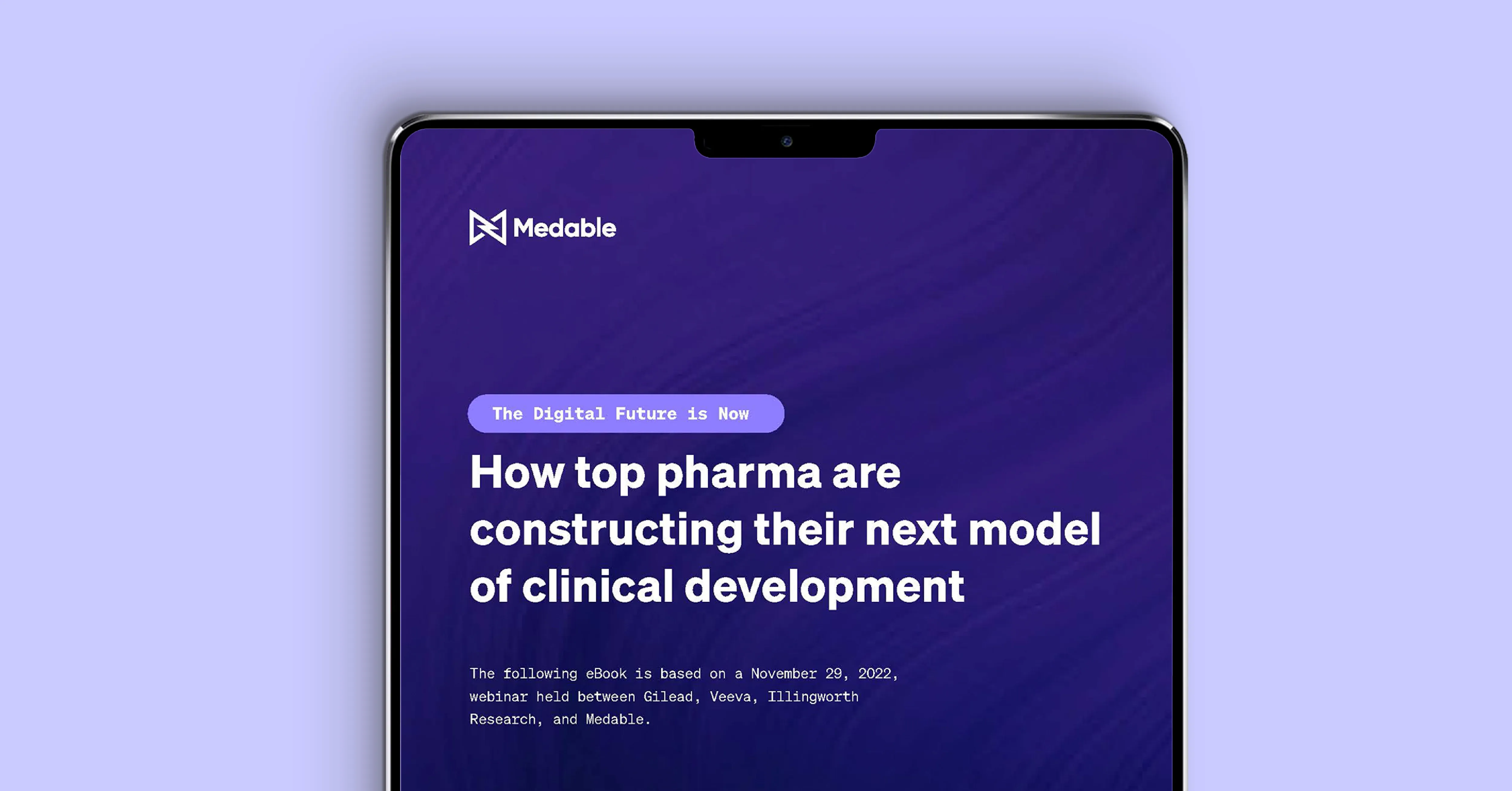Future of Clinical Research


Innovation Evidence : A Tufts CSDD workshop
In the five years since the pandemic, decentralized trial elements have solidified their status in medical product development.
Trials with decentralized elements have moved past the “pilot” phase. The question is no longer whether we can operationalize decentralized trial components, it's whether we’re doing it thoughtfully at the pace patients deserve. Our industry is ready to optimize the elements for the trial based on available evidence.
That’s exactly why Medable, in collaboration with and facilitated by the Tufts Center for the Study of Drug Development (Tufts CSDD), has launched the Innovation Evidence Workshop series.
Last November, the inaugural, invitation-only workshop brought leaders from 20 pharmaceutical, biotech, and CRO organizations together in Boston, with representation from the U.S. Food and Drug Administration, Harvard MRCT Center, Tufts CSDD, and Medable.


Unlocking scalability in pharma with AI
What is the path to addressing the remaining 10,000 human diseases?
Almost two years ago, Medable CEO Michelle Longmire asked this question in a blog titled “Accelerating the path from possibility to proof in the development of new medicines.” Back then, she wrote that leveraging the most meaningful tools we had at the time would drive new synergies at the intersection of safety, science, and speed and enable a new era of drug development.
Today, our industry stands at the precipice of a new era in clinical research, marked by rapid advancements in technologies that society widely refers to as artificial intelligence and machine learning (AI and ML). While each of these technologies has existed for some time, recent advancements in their capabilities have brought them to the forefront of our industry.
In the future, AI and ML may prove to be the most important technologies of our time, as they have the potential to enable true scalability in pharma, as well as other business sectors.


Patient perspectives: The balancing act of trial participation
When we think about clinical trials, our minds often gravitate toward the scientific intricacies of these studies - the testing of new treatments, data analysis, and the quest for medical breakthroughs. However, it's essential to remember that behind every clinical trial, there's a patient, and often a caregiver, whose life is deeply impacted by this journey.
So, let’s consider this: the concept of "Participation-Life Balance" and how technology can enhance the design and workflow of clinical trials while acknowledging the holistic needs of patients and caregivers to work towards achieving this.


Medable Petitions Comments on ICHE6(R3) Draft Guidance
When technology enters a regulated environment, early adopters often cite regulatory uncertainty as a hurdle. In fact, a 2021 Clinical Trials Transformation Initiative (CTTI) survey showed that regulatory uncertainty and lack of harmonization were the top reasons that hindered adoption of elements of decentralized clinical trials (DCTs).
During the COVID-19 pandemic, the increased adoption of decentralized methodologies was guided by temporary guidances put out by many regulators such as FDA’s March 2020 “Conduct of Clinical Trials of Medical Products During the COVID-19 Public Health Emergency” and the corresponding EMA guidance, which explicitly mentioned it would expire at the end of the designated Public Health Emergency.


Unlocking Patient Engagement: Enhancing the Clinical Trial Experience with Consumerization
In this panel discussion, industry experts from Uber Health, iXlayer, and Medable will discuss the rise in technology adoption has also raised the expectations of trial participants, who now seek simpler, more consumer-like experiences in clinical design.


The Digital Future is Now eBook
According to Grandview Research,the hybrid and decentralized clinicaltrial (DCT) market will be worth more than 12 billion dollars by 2030. Sparked by the COVID-19 pandemic of 2020, the rapid ascent of patient centered technology and the digital and decentralized trials they’ve spawned has forever changed the landscape of clinical conduct.


DCT Digital Week: Creating the Digital Foundation for Scale in Clinical Development
Learn how sponsors and CROs can improve their clinical trial conduct by developing new strategies that create sustainable, repeatable, and effective clinical conduct.


The Definitive Guide to Digital Evidence Generation
According to Grandview Research, the hybrid and decentralized clinical trial (DCT) market will be worth more than 12 billion dollars by 2030. Sparked by the COVID-19 pandemic of 2020, the rapid ascent of patient-centered technology and the digital and decentralized trials they’ve spawned has forever changed the landscape of clinical conduct. Sponsors are increasingly turning to DCT platforms in alignment with the rise of Life Science and Software-as-a-Service (SaaS) solutions. For those who haven't made the jump yet, there are many questions, including "What is a decentralized clinical trial?" Find out with this in-depth guide to decentralized clinical trials. Uncover how they work, their benefits, and how they transform clinical development.


Medable joins CancerX alliance to further the Cancer Moonshot
Along with some of the best companies in the world, Medable is proud to join CancerX as a founding member. This alliance is co-hosted by the Moffitt Cancer Center and the Digital Medicine Society (DiMe), alongside the Office for the National Coordinator for Health Information Technology (ONC) and Office of the Assistant Secretary for Health (OASH).


What does the new European Medicine Regulatory Network recommendation paper on decentralized elements in clinical trials tell us?
Learn what impacts the new European Medicine Regulatory Network recommendations paper means to your clinical trial operations.


New EU Regulatory Recommendations for Decentralized Trials Keep Focus on Patients and Sites
As clinical trials rapidly modernize, government regulators work to evolve even as the same core principles apply. Still, decentralized clinical trials are – simply – clinical trials, as all research today is decentralized in some way, yet we lack global harmonization of regulations.





